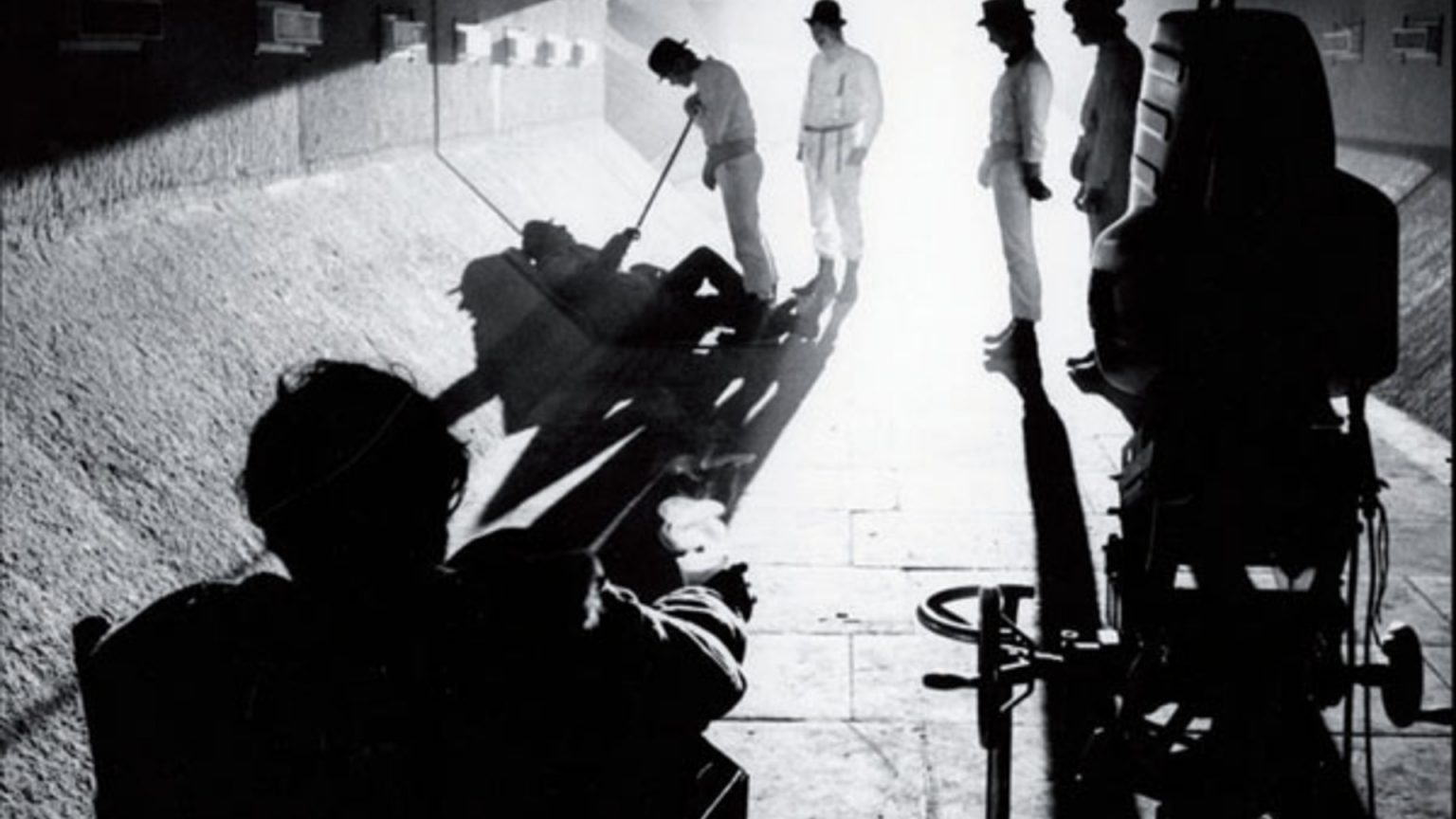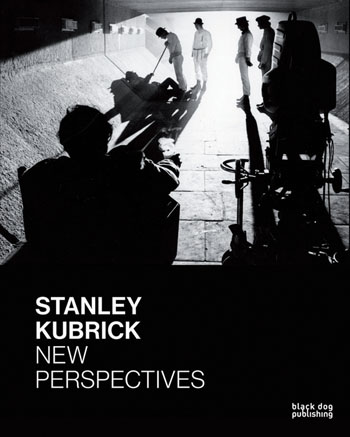Hey, it’s Stanley Kubrick‘s birthday. As it happens, the BFI has just posted an edited extract from the introduction to Stanley Kubrick: New Perspectives, a collection released by Black Dog Publishing in April. The intro’s a brief primer; to really delve into Kubrickiana, if you’re so inclined, you’ll want to scroll up and down the page maintained for a decade and a half now by Coudal Partners, “Stuff About Stanley Kubrick.”
Writing for The Curve at the Museum of Contemporary Art, Los Angeles, filmmaker Madison Brookshire quotes Gilles Deleuze on Josef von Sternberg: “It is no longer the struggle of light with darkness, but light’s adventure with white: this is Sternberg’s anti-expressionism.” Brookshire then argues that Jack Smith’s films “are equally distinct from the more expressionistic forms of avant-garde cinema that preceded them. The chiaroscuro of Maya Deren’s psychodramas or of Stan Brakhage’s mythopoetic films have little in common with the white opacities of Flaming Creatures. For Deren and Brakhage, the visual is a means of more effectively communicating a metaphor. In Smith as in Sternberg, however, it is not a question of what something represents, but what it reflects and all it makes possible.” Via Leo Goldsmith.
For Curbed, Patrick Sisson interviews “illustrator, concept artist and visual futurist” Syd Mead, who’s worked on Blade Runner (1982), TRON (1982), Aliens (1986) and, most recently, Elysium (2013): “Architects love Blade Runner, they just go bonkers. When I was working on the film, it was all about, let’s jam together Byzantine and Mayan and Post-Modern and even a little bit of Memphis, just mash it all together. We called it retro deco, or trash chic.” Via John Coulthart.
“Since [David Foster] Wallace’s suicide in 2008, 12 monographs, one film adaptation, and countless articles in academic and mainstream outlets have laid the foundation for the burgeoning Wallace Industry.” Writing for the Los Angeles Review of Books, Anna Shechtman elaborates before turning to James Ponsoldt’s The End of the Tour, which “has closed Wallace’s seemingly open circuit between writer and reader, making the author’s life and work appear more legible and linear than he ever would. And, perhaps more importantly, it has closed the circuit between the Wallace Industry and the industries that made Wallace: academia, journalism, and now independent film.”
For more on The End of the Tour, see our initial roundup, a more up-to-date collection at Critics Round Up and, as of today, Jesse Cataldo at Slant: “Surprisingly, the film itself is far from a disaster; it’s reserved, thoughtful, and genuinely engaging in its content, with an engrossing script and a complex performance from [Jason] Segel. Yet even considering these qualities, the entire premise still feels ill-conceived, as the attempts to humanize and elucidate this subject butt up against the inherent limitations of a pedestrian, persona-focused approach to filmmaking.”
New US trailer for Alex Ross Perry‘s Queen of Earth
“Decades after the down-and-dirty Decline of Western Civilization, a film which captures a scene emerging from the prehistoric miasma, the hardcore documentary has developed its own paint-by-numbers template.” Nick Pinkerton‘s dissection in his latest “Bombast” column for Film Comment is preceded by a brief history of the subgenre.
In the New York Times, J. Hoberman, too, is revisiting the 80s, reviewing new silver disc releases of Julien Temple’s Absolute Beginners (1986)—”A composition in hot magenta, ultra-turquoise and neon yellow, filled with sight gags and non sequiturs, as well as a fiery switchblade Armageddon, the movie is in every sense too much”—and Edo Bertoglio’s Downtown 81, “a lightly fictionalized, extensively post-dubbed documentary of Lower Manhattan boho night life as it was celebrated back in the day.”
Filmmakers David Barker and Matthew Porterfield talk with Pedro Costa about Horse Money for, appropriately enough, Filmmaker.
For Film International, Paul Risker talks with Bruno Dumont about Li’l Quinquin.
In Variety, Steven Gaydos has a few questions for Barbara Kopple about Harlan County USA (1976).
Jason Tanz introduces a profile for Wired: “Beyond their prodigious output, Mark and his brother, Jay, 42, are celebrated for creating an entirely new model of DIY filmmaking, one tailor-made for the Netflix era of digital distribution. Twenty years ago every young director dreamed of becoming the next Quentin Tarantino. Today they all want to be a Duplass brother.”
Back in the LARB, Nicole Antonio talks with Wendy C. Ortiz about her Hollywood Notebook, “a prose poemish memoir.”
At Flavorwire, Alison Nastasi responds to Jacob T. Swinney‘s audiovisual essay here in Keyframe, “Lynchian Ambience,” with a list of “ambient films” by other directors “who create an all-encompassing atmosphere characterized by impressionistic sights and sounds.”
IN OTHER NEWS
A collection of film reels dating back to 1909 has been discovered “in a dumped shelving unit at a recycling centre in Sidmouth, Devon,” reports Nick Enoch for the Daily Mail. Among the rediscoveries are one of the two remaining copies in the world of The Cardboard Lover (1928), starring Marion Davies, and, from France, Jane Is Unwilling To Work (1909). “The rest are a variety of feature films and shorts, ranging roughly from 1909 to 1913, and include films from France, Italy, India, America and the UK.” Via Movie City News.
The Film Society of Lincoln Center is honoring the late Brian Clark by establishing a fund for immersive storytelling in his name.
Terence Davies is now an Honorary Doctor of Literature at Edge Hill University.
GOINGS ON
New York. Cinema on the Edge, presenting the “Best of the Beijing Independent Film Festival 2012-2014,” has launched a site with a schedule (especially helpful because there are five different venues), details on the films, etc. In all, 18 programs will be rolling out between August 7 and September 13.
Starting Tuesday, the IFC Center and programmer C. Mason Wells present Celluloid Dreams, featuring, as the title promises, screenings of 35mm prints. On Tuesday, Greta Gerwig presents Jonathan Demme‘s Something Wild (1986) and a preview of Noah Baumbach’s Mistress America, co-written by and starring Gerwig. On Monday, August 24, Alex Ross Perry presents Joseph Losey‘s Secret Ceremony (1968) and, on Tuesday, September 8, Leslye Headland presents Mike Nichols‘s Working Girl (1988).
Also on Tuesday, Light Industry presents Noël Burch’s Correction Please, or How We Got into Pictures (1979) preceded by “one of the earliest ‘film study’ reels,” You Only Live Once: Production Takes from a Film in the Making, documenting the production of Fritz Lang‘s Hollywood crime picture.
With the BAMcinématek series Indie 80s on through August 27, the New Yorker‘s Richard Brody spotlights two films starring their directors. “In Lightning Over Braddock, from 1988 (screening July 28), [Tony] Buba set out to make a dramatic feature starring one of his former documentary subjects, Sal Caru, a colorful local character who boasted of gangland connections. What resulted instead is a grandly orchestrated, grimly comical, multilayered fantasy in which Buba, playing himself, both documents and dramatizes his own failed efforts to make that film.” And: “The only feature to date by Wendell B. Harris, Jr., Chameleon Street, from 1989 (screening Aug. 27), is an exuberantly comic drama that’s adapted from the true stories of two con men—and includes as actors some of the people involved in their lives.”
Berlin. On Tuesday, Monoduo Films and Mobile Kino present, at the Babylon, Robert Fantinatto’s I Dream of Wires (2014), a doc on the resurgence of the modular synthesizer. The screening will be followed by a live performance by Morton Subotnick, and Digital in Berlin notes that there’ll also be a Q&A moderated by Alec Empire of Atari Teenage Riot.
IN THE WORKS
The German Press Agency is reporting that Fatih Akin is taking over—from David Wnendt (Wetlands)—the adaptation of the late Wolfgang Herrndorf’s bestselling novel (in Germany, anyway), Tschick. Shooting’s to start in September.
OBIT
On Friday, Mickey Cottrell brought word to the English-speaking provinces of cinephilia that Pierre Cottrell, “a brilliant movie buff, and a rascal sweetie, who also produced or did other things on films by Eric Rohmer, Jean Eustache, Wim Wenders, Raúl Ruiz, Barbet Schroeder and Peter Bogdanovich, among many others,” had passed away at the age of 70. In 1962, Cottrell helped Schroeder and Rohmer found the vital production and distribution company Les films du losange. Via Movie City News.
ENDNOTE
Listening (70’42”). In 2006, Kent Jones spoke with Paul Schrader about his Film Comment essay, “Canon Fodder.”
For news and tips throughout the day every day, follow @KeyframeDaily. Get Keyframe Daily in your inbox by signing in at fandor.com/daily.





